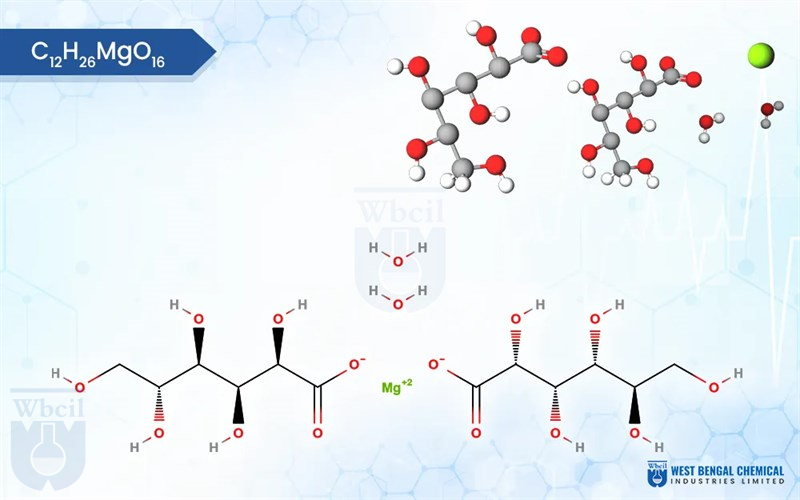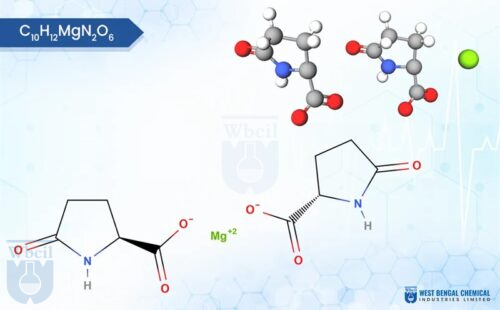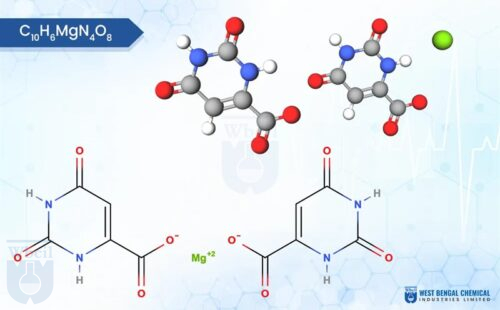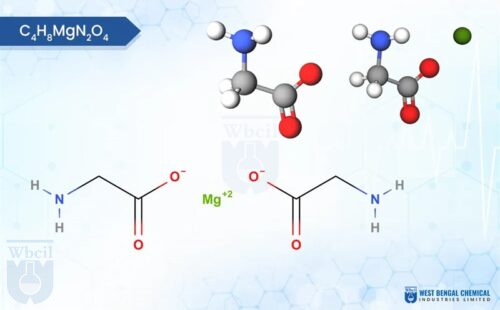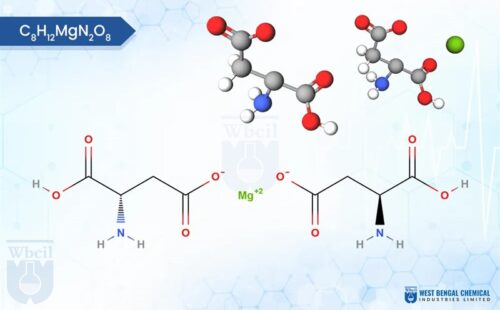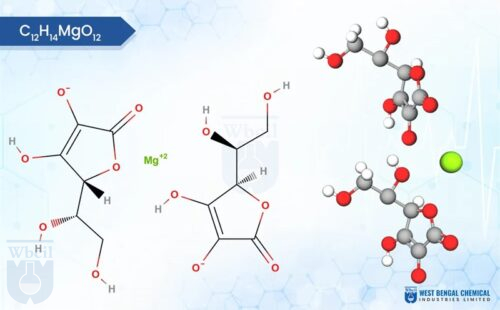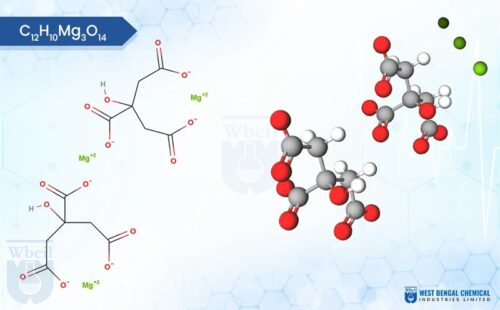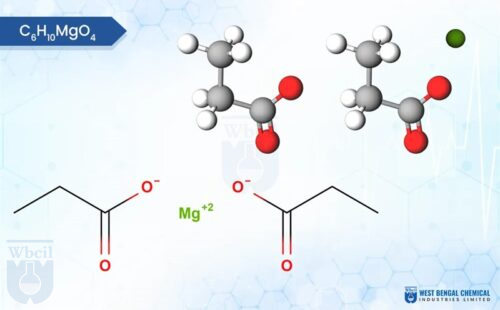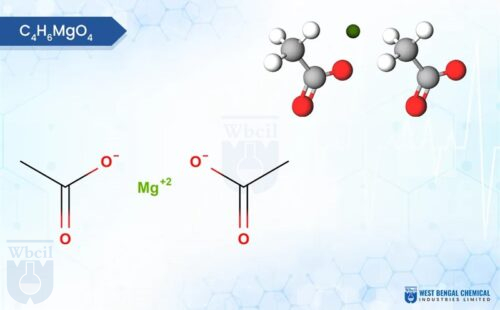-
Product Name:
Magnesium Gluconate
-
Molecular Formula:
C12H26MgO16
-
Molecular Weight:
450.63 g/mol
-
CAS No.:
59625-89-7
-
HSN Code:
29224990
-
CID Code:
71587201
-
Shelf Life:
3 years - 20°C powder
-
ATC Code (WHO)
A12CC03
-
DrugBank ID
DB13749
-
ChemSpider ID
9593457
-
UNII No.
T42NAD2KHC
- USP
- IUPAC Names
- Synonyms
- MSDS
USP of Magnesium Gluconate
- Better absorbed and tolerated than other magnesium forms.
- Less likely to cause digestive issues.
- Helps relax muscles and reduce cramps.
- Supports neurotransmitter balance for improved mood and sleep.
- Important for bone health.
- Can help regulate blood sugar.
IUPAC Names of Magnesium Gluconate
- Magnesium bis[(2R,3S,4R,5R)-2,3,4,5,6-pentahydroxyhexanoate]
- magnesium;(2R,3S,4R,5R)-2,3,4,5,6-pentahydroxyhexanoate;dihydrate
Synonyms of Magnesium Gluconate
- magnesium gluconate hydrate
- Magnesium gluconate
- 59625-89-7
- magnesium gluconate dihydrate
- Magnesium gluconate,dihydrate
- Magnesium D-gluconate (1:2) hydrate
- Magnesium D-gluconate (1:2) dihydrate
- UNII-T42NAD2KHC
- T42NAD2KHC
- Magnesium gluconicum
- Magnesium (as gluconate)
- D-Gluconic acid, magnesium salt (2:1), hydrate
- Magnesium gluconate, dihydrate
- Magnesium (2R,3S,4R,5R)-2,3,4,5,6-pentahydroxyhexanoate dihydrate
- magnesium;(2R,3S,4R,5R)-2,3,4,5,6-pentahydroxyhexanoate;dihydrate
MSDS of Magnesium Gluconate
Download MSDS PDF- MSDS Name: Magnesium Gluconate Anhydrous
- Product Code: MGAUS98
- Relevant identified uses of the substance or mixture and uses advised against: Laboratory chemicals, Industrial & for professional use only.
- Eye Contact: Check for and remove any contact lenses. In case of contact, immediately flush eyes with plenty of water for at least 15 minutes. Get medical attention if irritation occurs.
- Skin Contact: Wash with soap and water. Cover the irritated skin with an emollient. Get medical attention if irritation develops.
- Ingestion: Do NOT induce vomiting unless directed to do so by medical personnel. Never give anything by mouth to an unconscious person. If large quantities of this material are swallowed, call a physician immediately. Loosen tight clothing such as a collar, tie, belt or waistband.
- Inhalation: If inhaled, remove to fresh air. If not breathing, give artificial respiration. If breathing is difficult, give oxygen. Get medical attention.
- Flammability of the Product: May be combustible at high temperature.
- Auto-Ignition Temperature: Not available.
- Flash Points: Not available.
- Flammable Limits: These products are carbon oxides (CO, CO2), nitrogen oxides (NO, NO2…). Some metallic oxides. Products of Combustion: Slightly flammable to flammable in presence of heat. Non-flammable in presence of shocks.
- Fire Hazards in Presence of Various Substances: Slightly explosive in presence of open flames and sparks. Non-explosive in presence of shocks.
- Fire Fighting Media and Instructions:
SMALL FIRE: Use DRY chemical powder.
LARGE FIRE: Use water spray, fog or foam. Do not use water jet. - Special Remarks on Fire Hazards: As with most organic solids, fire is possible at elevated temperatures
- Special Remarks on Explosion Hazards: Fine dust dispersed in air in sufficient concentrations, and in the presences of an ignition source is a potential dust explosion hazard.
- Eyes: Wear appropriate protective eyeglass or chemical safety goggles. Make sure that there is an eyewash facility in your vicinity.
- Skin: Wear impervious gloves and protective clothing.
- Respiratory: Use a NIOSH approved respirator when exposure limits are exceeded or if irritation or other symptoms are experienced.
- Exposure Limits: Consult local authorities for acceptable exposure limits.
- Appearance Form: Crystalline or granular powder
- Color: White or almost white
- Odour: Characteristic
- pH of 5 % w/v aqueous solution: 6.0 – 7.8
- Melting point/freezing point: No data available
- Initial boiling point and boiling range: 673 ˚c
- Sublimation Temperature: No data available
- Density: No data available
- Vapour pressure: No data available
- Vapour density: No data available
- Refractive Index: No data available
- Water solubility: Freely soluble in water.
- Decomposition temperature: No data available
- Viscosity: No data available
- Other safety information: No data available
- https://whmis.org/sds/
- https://www.osha.gov/sites/default/files/publications/OSHA3514.pdf
- https://reachonline.eu/reach/en/annex-ii.html
- https://www.cdc.gov/niosh/npg/
- https://pubchem.ncbi.nlm.nih.gov/compound/Magnesium-Gluconate
- https://en.wikipedia.org/wiki/Magnesium_gluconate
- https://www.chemspider.com/Chemical-Structure.9593457.html
- https://www.chemicalbook.com/ChemicalProductProperty_EN_CB9175129.htm
- https://go.drugbank.com/drugs/DB13749

Description of Magnesium Gluconate
Magnesium gluconate, a well-regarded magnesium supplement, boasts a unique combination of physical and chemical properties. Typically appearing as a white to off-white powder [1], it’s odorless and possesses a slightly sweet taste. Interestingly, magnesium gluconate exhibits hygroscopic behavior, meaning it attracts moisture from the surrounding environment.
This necessitates storing it in airtight containers to maintain its characteristic texture, which can range from fluffy to slightly granular [3]. On the scientific side, magnesium gluconate is the magnesium salt of gluconic acid. Chemically formulated as C12H26MgO16, it holds the distinction of having the highest oral bioavailability among common magnesium salts [2]. This translates to better absorption within the body, maximizing the benefits of magnesium supplementation.
As a leading API manufacturer, WBCIL prioritizes strict CGMP and ISO quality control measures throughout the production process. The prolonged experience from 1962 ensures consistent potency, purity, and safety in every dose of WBCIL’s Magnesium gluconate.
Application of Magnesium Gluconate
Enhanced Absorption and Tolerance
- Better Absorption: Magnesium gluconate is absorbed more efficiently by the body than many other magnesium forms, making it ideal for those with magnesium deficiencies.
- Gentle on Digestion: It is well-tolerated and less likely to cause gastrointestinal discomfort, such as diarrhea or stomach upset, making it suitable for individuals with sensitive digestive systems.
Muscle Relaxation and Cramp Relief
Reduces Muscle Cramps: Magnesium gluconate helps relax muscles, making it useful for reducing cramps and spasms, especially for athletes or those prone to muscle tightness or cramps due to magnesium deficiency.
Mood and Sleep Support
Improves Sleep and Mood: Magnesium gluconate supports neurotransmitter balance, helping to regulate mood and improve sleep quality by promoting relaxation and reducing anxiety. It’s particularly helpful for individuals experiencing stress or insomnia.
Bone Health Maintenance
Supports Bone Density: Magnesium is crucial for bone health, working in conjunction with calcium to maintain strong bones. Magnesium gluconate is beneficial for people aiming to support or improve their bone density, especially those at risk for osteoporosis.








